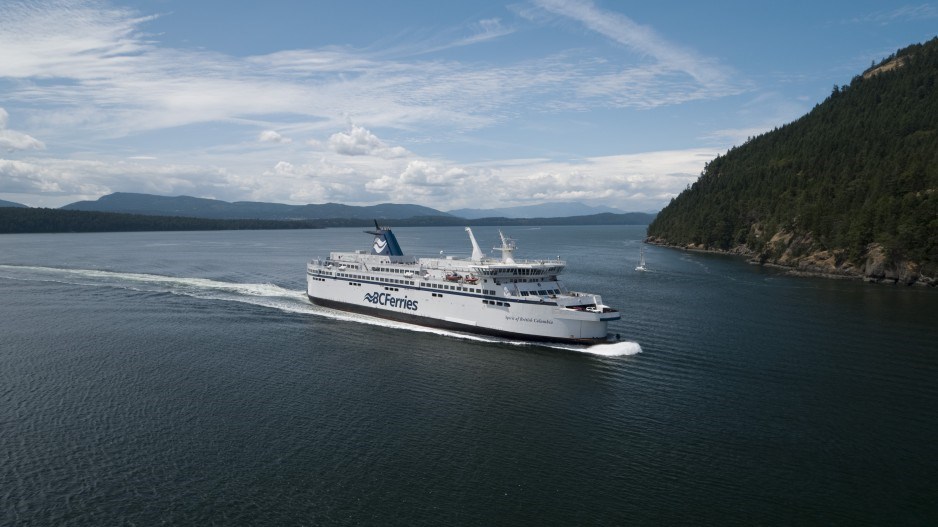Old BC NDP stereotype: Fast Ferries.
New BC NDP stereotype: Slow Ferries.
Even: No Ferries.
For an activity we British Columbians consider part of our way of life, BC Ferries has presented us in recent years with a test of what we will bear when it comes to embarrassment, enragement, expense, dysfunction, distress and demoralization in our way to live.
We were able to accept its history of blowing past budgets as would a frenzied, benevolent holiday shopper, and to accept that its fleet of yesterday’s models were the maritime versions of our yesteryear fighter jet brigade.
We even appeared to accommodate the conceit that there existed on its vessels, somewhere and somehow, free and functional Wi-Fi; we treated it like a treasure hunt which, when discovered, was like finding a popsicle during a heat dome.
We seemed to be able to endure – to, yes, have the resilience for – that drain on public finances and display of last-century infrastructure, until the lineups lengthened, the sailing waits extended, the fleet couldn’t fire up consistently, the website went wonky, and the work force strangely shrunk from the task.
At that inflection point amid the constellation of challenges, truly we’d had enough. The data, I am sure, is much better than our perceptions today of a service rife with stifled sailings, staff shortages and scheduling snafus. No matter: The ferries have become a metaphor for public sector futility.
But like all of our larger problems – health care, housing affordability and climate change, to name some honkers – the systemic ferry follies are neither quickly created nor imminently solvable.
If blame is your game, there is much to go around: Successive provincial governments that navigated indifferently on cruise control, and operational and board leadership over the years that was more reactive than proactive.
But if I may speak more personally, we can also blame ourselves.
Yes, us. We need to own quite a bit of this.
On the issue of the ferries – as with real estate, health care and climate change – the public has been able for a generation to watch the frog in the water on the stove as the heat was raised and raised and raised.
We chose to disregard the signs of institutional fracture and failure, and just as when the ever-elevating temperature of the water suddenly snuffs the frisky frog, we seemed shocked at having to wake up to what we could have recognized and remediated sooner.
This is where we find BC Ferries: Ignored by us until we developed high anxiety. We have known most of the solutions for years, and we just put them off until we could put them off no longer. We didn’t press politicians to lean in or penalize them when we didn’t – as we did with the Fast Ferries – because we didn’t believe the problems would get to where they have. By the time they did, we wanted a rapid response.
Now we’re mad at those running it, instead of looking in the mirror at who is financing it.
The report last month from the province’s Ferry Commission, following a Deloitte assessment of the BC Ferries capital plan, provides a strong portrait of its longer-term challenges but identifies some of the immediate underlying problems – like forecasting and managing costs properly.
It is on the backs of new leadership at BC Ferries to right the ships, particularly on new CEO Nicolas Jimenez, who is (no pun intended) on a crash course to correct course. In discussions on this, current and former executives and industry experts agree the tasks are formidable, excruciatingly slow to address considering the public mood, and unlikely to yield a result that matches our nostalgic recollections of so-called better days.
We got ourselves into it over time and getting ourselves out of it may not take any less time, no matter that public patience is conditioned increasingly by the instant gratification we find elsewhere in many corners of our lives.
So, while the remedies cannot come soon enough, summer by summer for travellers and winter by winter for residents, we will need to accept that the slow-in-arriving solutions will tax our patience and our purse.
There is seemingly everything to do and nothing to do about that – except wait and hope.
Which is what we do, anyway, in these sailing-filled, mechanical-difficulty, staff-scarcity times.
Kirk LaPointe is BIV publisher and executive editor and vice-president, editorial, of Glacier Media.






